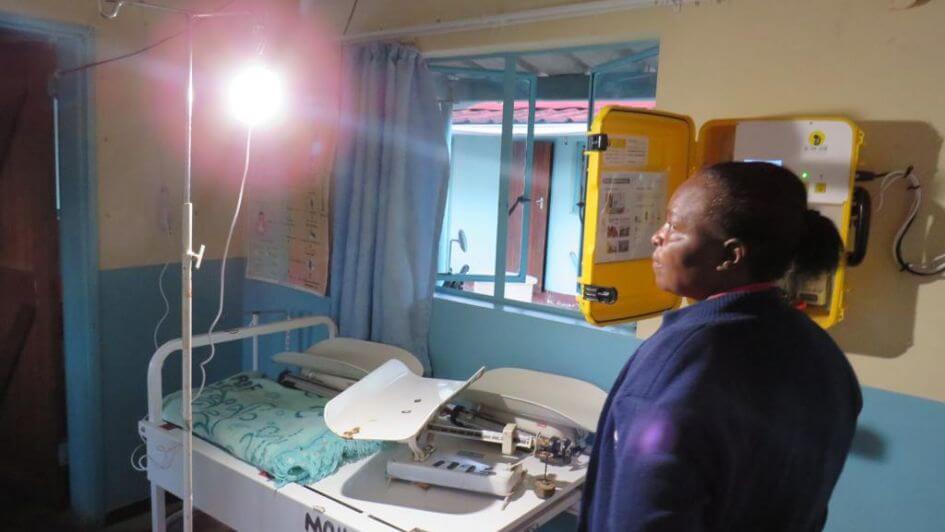Bentoe Tehoungue, Director of Family Health at Liberia’s Ministry of Health, sent out an email recently calling for help in facing the COVID-19 pandemic. “Please consider this communication as an SOS call from Liberia,” she wrote. Her primary request wasn’t for ventilators, PPE, or even oxygen to respond to the spread of the coronavirus, it was a call for light and electricity.
The COVID-19 pandemic is not only exposing glaring deficiencies in fragile health systems— Liberia has less than a handful of working ventilators—it is threatening to erode hard-earned gains in maternal-child health (MCH). Globally, 300,000 women die every year from complications of pregnancy and childbirth. Most of these deaths could be prevented with prompt access to emergency obstetric care. High rates occur in regions marked by widespread poverty, limited education, scant antenatal care, and other factors leading to delays in identifying and treating pregnancy complications. Public health agencies have been steadily working to improve MCH indicators: building a network of community health workers, discouraging home deliveries, developing emergency transport schemes, boosting midwifery skills, and improving health care infrastructure.
Policymakers and development organization have hard decisions to make: how to focus on COVID-19 without dismantling many of these achievements.
“We have learned from the Ebola experience,” Bentoe states. “We are trying to strengthen the normal services so we don’t have the adverse effects we had with Ebola.” During that epidemic, more women chose to deliver at home, fearing health centers. It is estimated that the indirect obstetric deaths from home deliveries in West Africa were as numerous as the direct deaths from Ebola itself.
Liberia is working to mobilize protective gear for every health facility and set up triage stations and isolation rooms. To provide quality medical care, health workers need personal protective equipment, basic supplies, like thermometers, soap, and water, and brightly lit spaces to triage and isolate people with symptoms until they transfer to higher level facilities.
If health workers are unprepared with protective gear and basic supplies, their personal fear is overwhelming and the consequences on health services can be disastrous. Imagine the experience of health workers who are expected to provide frontline care in near-darkness. Some health workers have turned away expectant mothers in labor– resulting in deliveries without skilled providers or equipment. “One mother gave birth in a home adjacent to the health center after she was turned away from the clinic,” Bentoe reports. “Another tried to walk home and gave birth in the community being assisted by an unskilled attendant as well.”
“COVID-19 has increased the need for lighting at all of our facilities,” Bentoe continues “and added the burden for lighting critical areas in the health facilities, including the triage station, isolation areas among others. This SOS is to help address this serious problem that affects the women we are trying very hard to serve and protect.”
These concerns are not unique to Liberia. Dr. Charles Olaro, Director of Curative Services at the Ministry of Health in Uganda, has requested solar electricity for isolation centers and medical facilities.
“Electricity, even without COVID-19, is one of the essentials you need for effective service delivery. With COVID-19 it is more essential in terms of infection prevention and control, both at the points of isolation but also at the points of quarantine.” Dr. Olaro fears the impact on other health outcomes. “We don’t want to lose focus and have more deaths from causes other than COVID. You want to be sure that mothers will still be able to deliver, and that emergency care, surgical care, and any other services can continue. Electricity is essential, with or without COVID.”
Dr. Bernard Madzima at the Ministry of Health in Zimbabwe concurs. “In Zimbabwe, we know the health system was already challenged before COVID-19 and this makes things worse. We have confirmed cases of COVID-19 and we have to be ready for the worst-case scenario. It has become even more important to have electricity now.”
Although the situation is challenging, COVID-19 also offers an opportunity. Global attention on public health care provides a spotlight on deficiencies that have plagued African health centers for decades: a lack of running water, inadequate supplies of standard equipment and unreliable electricity. With this spotlight comes an opportunity to accelerate efforts to achieve sustainable energy for all health care institutions.
As Dr. Madzima reminds us, “For us, having light should be part of the protective equipment. At the heath facilities that are going to be dealing with COVID-19 they should have adequate light for testing, for isolation, and for adequate treatment. We should take this as the opportunity to strengthen all the components of health system delivery, including infrastructure, including lighting.”
Laura E. Stachel, MD MPH is the Executive Director and co-founder of We Care Solar. She is a former obstetrician-gynecologist with fourteen years of clinical experience. She serves on the Editorial Board for the Berkeley Wellness Letter and co-chaired an international working group on Energy and Health for the UN Foundation. She speaks around the world on the nexus of energy access, health care, climate change, and gender equity.
